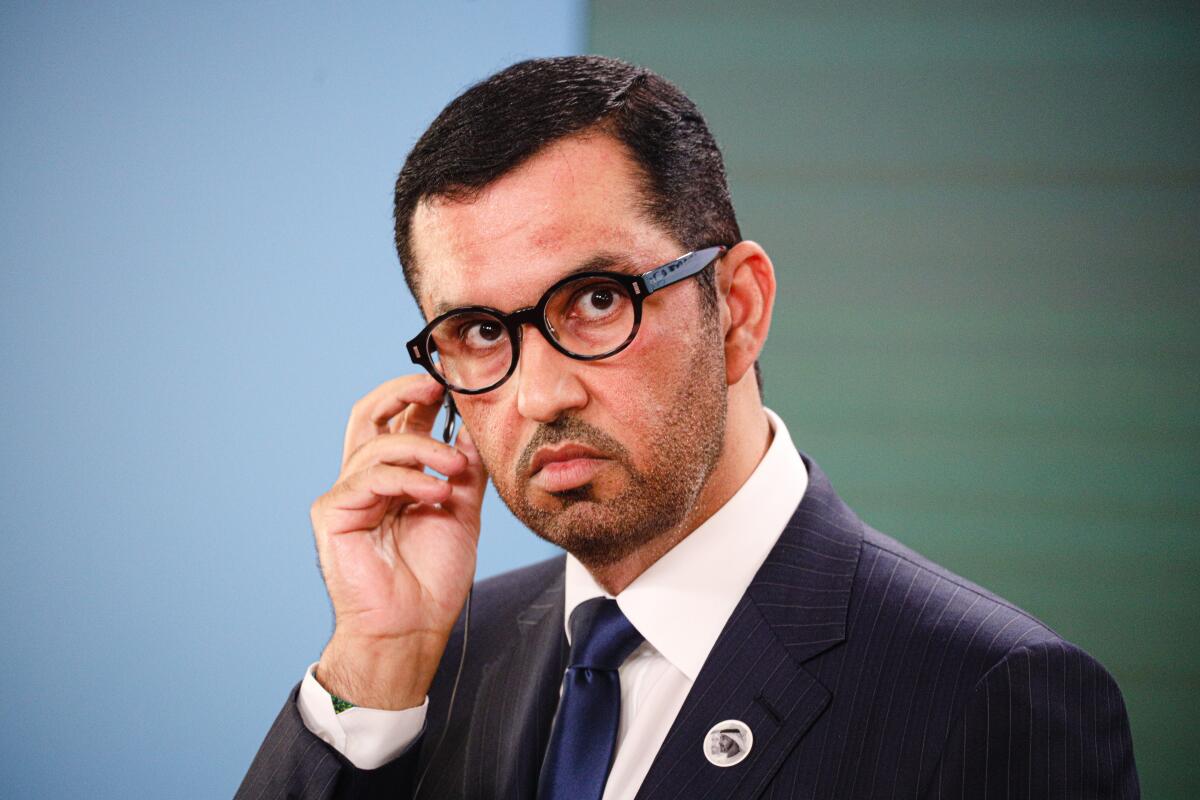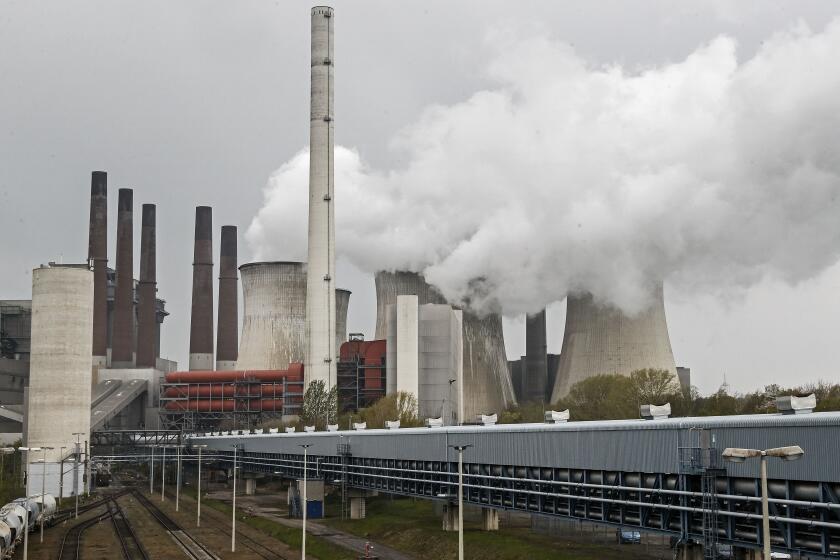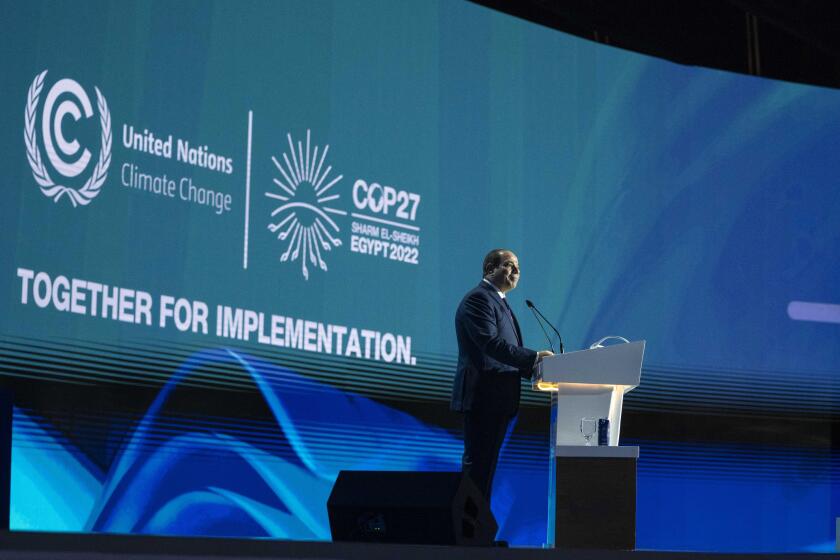Editorial: An oil executive’s going to host the U.N. climate summit. It shows who’s really in charge

This year’s United Nations climate summit in Dubai marks another opportunity for world leaders to do more to slow global warming, replace fossil fuels with renewable energy and be held accountable for their emissions-cutting pledges.
But how effective can we expect these negotiations to be when they’re presided over by an oil executive?
The president of this fall’s COP 28 summit, being hosted by the United Arab Emirates, will be Sultan Al Jaber, who runs the state-owned Abu Dhabi National Oil Co.
The naming of Al Jaber to this position is so obvious a contradiction that climate activists and politicians have likened it to letting arms dealers lead peace talks or putting a tobacco CEO in charge of health policy. Public pressure for his ouster increased last week when more than 130 U.S. and European lawmakers called for Al Jaber to be removed, writing in a joint letter of their “profound concern” that the U.N. is permitting “private sector polluters to exert undue influence.”
U.N. climate report shows we can’t just phase out oil and gas; we have to deliberately dismantle existing infrastructure, such as coal plants in China and drilling in Alaska.
Putting an oil executive in charge is not only a bad look, it stands to undermine important and urgent negotiations and further erode public confidence in summits that have been criticized as little more than high-level venues for greenwashing. And it increases the likelihood that we’ll see another year of frustratingly little progress, where world leaders make only incremental changes while the climate crisis barrels ahead. The U.N. Intergovernmental Panel on Climate Change warned in a report two months ago that the planet is on track to blow past 1.5 degrees Celsius (2.7 degrees Fahrenheit) of warming within a decade unless we immediately switch to renewable energy and slash greenhouse gas pollution in half by 2030.
But at the same time, the decision to pick Al Jaber to lead the summit only clarifies for the public how much power oil and gas interests already wield in this process. The fossil fuel industry is one of the largest delegations at the summits, sending more than 600 of its lobbyists to last year’s COP 27 summit in Egypt, up from about 500 the year before in Scotland.
COP 28 organizers pointed to Al Jaber’s experience as an engineer, a global energy industry leader and his other position as chair of Masdar, another state-owned company that develops solar and wind farms and other renewable energy projects. U.S. climate envoy John F. Kerry has defended Al Jaber as a “terrific choice” precisely because of his position as the head of an oil company who understands the need to transition to renewables.
The trend toward bigger, heavier electric vehicles is not good for the planet. Regulators need to push back to encourage more smaller, affordable models from carmakers.
Fossil fuel companies, of course, have a huge financial stake in how quickly the world weans itself off their products and a role in that transition. They have a place, but as Rep. Ro Khanna (D-Fremont) told the Washington Post, “just don’t put them at the head of the table.”
Oil and gas interests have spent decades attacking the science and solutions to climate change using disinformation, delay and an arsenal of other tactics to prolong their profits. And they are increasingly pushing a scenario in which they don’t have to stop pumping oil and gas, but will instead sell the world on largely unproven carbon-capture and storage technology and other dubious ways to suck up or offset the greenhouse gas emissions produced.
In that vein, Al Jaber said in a speech earlier this month that countries should be “laser-focused on phasing out fossil fuel emissions, while phasing up viable, affordable, zero-carbon alternatives.” Experts interpreted those remarks, because they address “emissions” rather than production, as a pitch for continued extraction and burning of fossil fuels combined with carbon-capture and storage projects.
Al Jaber’s views won’t do anything to help resolve a sticking point among world leaders, who over the last few years of negotiations have been unable to agree on the need to abandon fossil fuels and replace them with clean renewable energy.
A new agreement to compensate poor nations for the effects of global warming is an important step for climate justice. But it will be hollow victory until world leaders take decisive action to end fossil fuels.
The final agreement world leaders reached at COP 27 last year in Egypt committed only to a “phasedown of unabated coal power” and an increase in “low-emission” energy — code for burning more planet-warming natural gas.
It was the United Arab Emirates’ decision to appoint Al Jaber, and it seems unlikely that one of the world’s largest oil producers will reverse course.
But it‘s a good bet that these talks would be different if they were held in the front-line communities most harmed by the climate crisis, such as low-lying island nations that will be flooded, and arid regions facing desertification and drought. If they hosted the negotiations and their representatives outnumbered oil and gas lobbyists, summit leaders would be talking less about whether fossil fuels need to go and more about how to replace them as quickly and equitably as possible.
More to Read
A cure for the common opinion
Get thought-provoking perspectives with our weekly newsletter.
You may occasionally receive promotional content from the Los Angeles Times.













